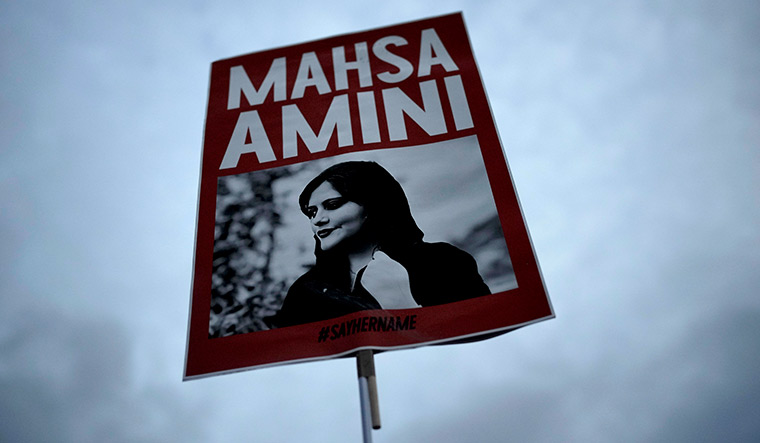Iran Blinks, Does Away With Morality Police
Dec 5, 2022 | Pratirodh Bureau
A placard with the picture of 22-year-old Mahsa Amini, who allegedly died in the custody of Iran's morality police (Image: PTI)
Iran’s morality police, which is tasked with enforcing the country’s Islamic dress code, is being disbanded, the country’s Attorney General has said, according to a media report. Iran’s Attorney General Mohammad Jafar Montazeri’s comments, yet to be confirmed by other agencies, were made at an event on Sunday, BBC reported.
Iran has seen months of protests over the death of a young woman in custody, the report said. Mahsa Amini had been detained by the morality police for allegedly breaking strict rules on hijab (head covering). Iran’s government insists Amini was not mistreated, but her family says her body showed bruises and other signs of beating after she was detained.
Montazeri was at a religious conference when he was asked if the morality police was being disbanded. “The morality police had nothing to do with the judiciary and have been shut down from where they were set up,” he said. Control of the force lies with the Interior Ministry and not with the judiciary.
On Saturday, Montazeri also told the Iranian parliament the law that requires women to wear hijab would be looked at, BBC reported. Even if the morality police is shut down, this does not mean the decades-old law will be changed.
Women-led protests, labelled “riots” by the authorities, have swept Iran since 22-year-old Amini died in custody on September 16, three days after her arrest by the morality police in Tehran. Her death was the catalyst for the unrest but it also follows discontent over poverty, unemployment, inequality, injustice and corruption, BBC reported.
If confirmed, the scrapping of the morality police would be a concession but there are no guarantees it would be enough to halt the protests, which have seen demonstrators burn their head coverings.
Iran has had various forms of morality police since the 1979 Islamic Revolution, but the latest version — known formally as the Gasht-e-Ershad — is currently the main agency tasked with enforcing Iran’s Islamic code of conduct.
They began their patrols in 2006 to enforce the dress code which also requires women to wear long clothes and forbids shorts, ripped jeans and other clothes deemed immodest, BBC reported.
Since September, Iran has been roiled by nationwide protests that have come to mark one of the greatest challenges to its theocracy since the chaotic years after its 1979 Islamic Revolution.
In a statement issued by the state-run IRNA news agency on Saturday, the country’s national security council announced that some 200 people have been killed during the protests, the body’s first official word on the casualties. Last week, Iranian Gen. Amir Ali Hajizadeh tallied the death toll at more than 300. The contradictory tolls are lower than the toll reported by human rights activists in Iran.
Earlier, soccer fans in Iran’s Kurdish region set off fireworks and honked car horns to celebrate the US win over the Iranian national team in a politically charged World Cup match that divided the protest-riven country.
Cheering fans hit the streets in Iran’s Kurdish-majority province of Kurdistan and fireworks lit the skies over the Bukan area of West Azerbaijan province to celebrate the Iranian team’s 1-0 loss.
Some shouted “Death to the dictator,” a popular protest slogan referring to the Iran’s Supreme Leader Ayatollah Ali Khamenei. The Kurdish areas of Iran have been hot spots of ongoing anti-government demonstrations.
(Agencies)
